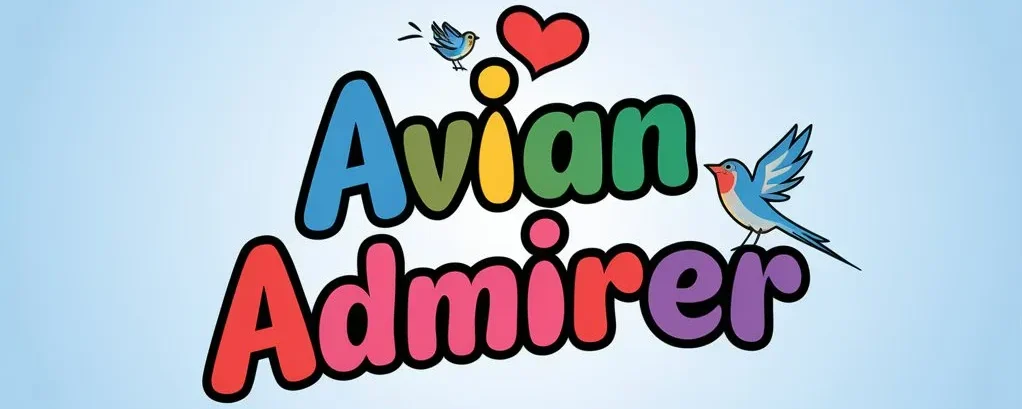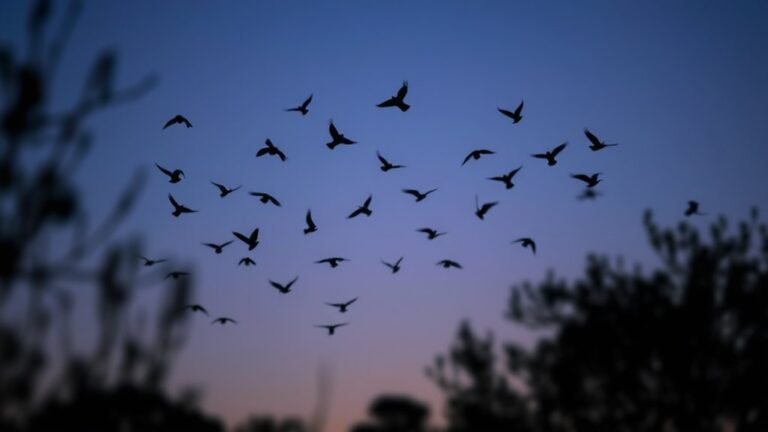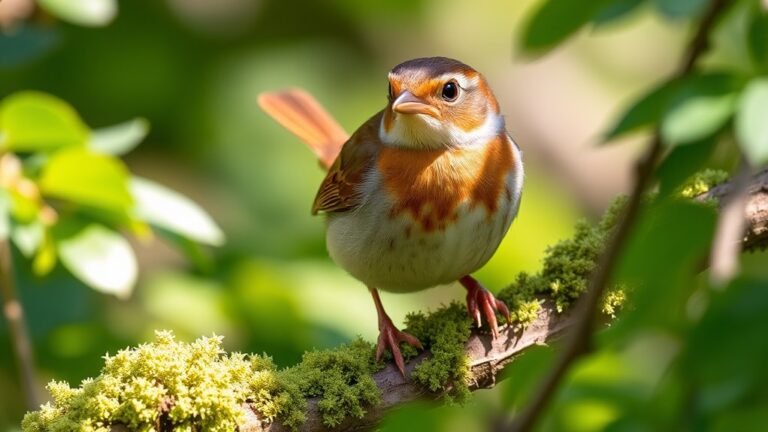Keeping Squirrels Away from Your Bird Feeder: Effective Methods
Squirrels can be persistent visitors to bird feeders, often outcompeting birds for food. However, there are several humane ways to deter squirrels without causing them harm.
This guide will explore effective strategies to keep your bird feeder squirrel-free while ensuring the well-being of all wildlife in your yard.
Key Takeaways

- Position matters: Place feeders at least 7 feet high and away from trees and structures
- Baffle power: Install squirrel baffles above hanging feeders or on poles
- Smart feeder design: Use weight-activated or specially designed squirrel-proof feeders
- Seed selection: Opt for safflower seeds, which squirrels find less appealing
- Cleanliness counts: Regularly clean up spilled seeds to reduce attraction
- Spice it up: Add cayenne pepper to bird seed as a natural deterrent
- Separate feeding: Provide a dedicated squirrel feeder away from bird feeders
- Obstacle course: Create challenges for squirrels to reach feeders
- Pole materials: Use smooth materials like copper or PVC for feeder poles
- Scent deterrents: Apply cinnamon or peppermint sprays around feeding areas
- Height and distance: Follow the 5-7-9 rule for optimal feeder placement
Strategic Feeder Placement
The location of your bird feeder plays a crucial role in deterring squirrels. Place feeders at least 7 feet high and 7 feet away from any structures squirrels can climb, such as trees, fences, or walls. This height and distance make it challenging for squirrels to reach the feeder.
Optimal placement is key to discouraging squirrels. By strategically positioning your feeder, you create a natural barrier that makes it difficult for these agile creatures to access the bird food.
Remember that squirrels are excellent climbers and jumpers, so consider all possible access points when choosing your feeder location.
Baffle Installation
Adding a squirrel baffle is an effective way to prevent squirrels from accessing your bird feeder. These cone-shaped devices can be installed above hanging feeders or on poles. Baffles create an unstable surface that squirrels cannot grip, causing them to slide off.
Baffles are a simple yet highly effective solution to the squirrel problem. They work by creating a physical barrier that squirrels find difficult to navigate.
When selecting a baffle, choose one made of durable materials that can withstand outdoor conditions and persistent squirrels.

Squirrel-Proof Feeder Designs
Invest in feeders specifically designed to outsmart squirrels. Weight-activated feeders close their ports when a squirrel’s weight is detected, while still allowing lighter birds to feed. These feeders are often made of durable materials resistant to chewing.
Innovative feeder designs have revolutionized bird feeding by incorporating clever mechanisms to deter squirrels. These feeders often feature spring-loaded perches or collapsible feeding ports that close under a squirrel’s weight.
While more expensive than traditional feeders, they can save money in the long run by preserving bird seed for its intended recipients.
Seed Selection Strategy
Choose bird seeds that are less appealing to squirrels. Safflower seeds are a good option as squirrels typically don’t prefer them. This allows birds to enjoy their meal while discouraging squirrel visits.
Selective seed choice can be a powerful deterrent against squirrels. By offering seeds that birds love but squirrels dislike, you create a natural way to keep squirrels at bay.
Consider using a mix of safflower, nyjer, and white millet seeds, which are less attractive to squirrels but still enticing to many bird species.
Maintain a Clean Feeding Area
Regularly clean up spilled seeds and hulls around your feeder. This practice not only deters squirrels but also reduces the risk of disease transmission among birds. A tidy feeding area is less likely to attract unwanted visitors.
Cleanliness is not just about aesthetics; it’s a crucial aspect of effective squirrel deterrence. A clean feeding area reduces the scent that attracts squirrels and other pests.
Additionally, it promotes better bird health by preventing the buildup of moldy or spoiled seeds that can harm your feathered visitors.

Spicy Deterrent
Add a sprinkle of cayenne pepper to your bird seed mix. Birds cannot taste the spiciness, but squirrels find it unpleasant. This natural deterrent can be an effective way to keep squirrels at bay without harming them.
The spicy solution takes advantage of the different taste sensitivities between birds and mammals. While birds are unaffected by capsaicin, the compound that makes peppers hot, squirrels have a strong aversion to it.
This method is both humane and effective, providing a natural way to protect your bird seed without resorting to harmful chemicals.
Separate Squirrel Feeding Station
Consider setting up a dedicated squirrel feeder away from your bird feeders. Offer foods that squirrels enjoy, such as peanuts or dried corn. This can distract them from the bird feeders and provide an alternative food source.
Creating a separate feeding area for squirrels can be a win-win solution. By offering squirrels their own food source, you not only reduce competition at your bird feeders but also get to enjoy watching these playful creatures in a controlled setting. Place the squirrel feeder far enough from bird feeders to prevent crossover.
Create an Obstacle Course
Make it challenging for squirrels to reach your feeders by creating obstacles. String your feeder between two poles at least 7 feet apart, with empty soda bottles on the wire. This makeshift tightrope is difficult for squirrels to navigate.
An obstacle course adds an element of fun and challenge to your squirrel deterrence efforts. By creating a series of barriers or unstable surfaces, you make it physically demanding for squirrels to reach the feeder.
This method not only protects your bird seed but can also provide some entertaining moments as you watch squirrels attempt to overcome the obstacles.
Choose Slippery Pole Materials
When installing feeder poles, opt for materials that are difficult for squirrels to climb. Copper or PVC pipes are smooth and provide less grip compared to wood or metal poles.
The choice of pole material can significantly impact a squirrel’s ability to access your feeder. Smooth, slippery surfaces like copper or PVC make it nearly impossible for squirrels to gain traction.
Consider coating existing poles with a non-toxic, slippery substance to further deter climbing attempts.
Scent-Based Repellents
Create a homemade spray using cinnamon, cayenne pepper, or peppermint mixed with water. Apply this around your feeding area regularly, especially after rain. These scents are unappealing to squirrels but safe for birds.
Aromatic deterrents can be a powerful tool in your squirrel-proofing arsenal. Squirrels have a keen sense of smell and are often repelled by strong, spicy, or minty odors. By regularly applying these scents around your feeding area, you create an invisible barrier that discourages squirrels from approaching.
The 5-7-9 Rule
Follow the 5-7-9 rule for optimal feeder placement:
- Place feeders at least 5 feet high
- Position them at least 7 feet away from any jumping-off point
- Ensure they are at least 9 feet below any overhanging branches
The 5-7-9 rule provides a simple yet effective guideline for positioning your bird feeders. This rule takes into account the jumping and climbing abilities of squirrels, creating a zone that is difficult for them to access. By adhering to these measurements, you significantly reduce the chances of squirrels reaching your feeders.

Use Spinners
Install spinner devices around the base of your feeder. These rotate when a squirrel tries to climb them, gently dislodging the animal without causing harm. While effective, they also provide a humorous deterrent.
Spinning devices add an element of unpredictability that squirrels find challenging. As they attempt to climb, the spinner rotates, causing them to lose their grip and fall harmlessly to the ground.
This method not only deters squirrels but can also provide entertainment for bird watchers as they observe the squirrels’ acrobatic attempts.
Regular Maintenance
Consistently monitor and maintain your squirrel-proofing methods. Adjust strategies as needed and ensure all devices are functioning properly to maintain their effectiveness over time.
Ongoing maintenance is crucial for long-term success in deterring squirrels. Regularly inspect your feeders, baffles, and other deterrents for signs of wear or damage.
Be prepared to adapt your strategies as squirrels may learn to overcome certain obstacles over time. Consistent upkeep ensures that your squirrel-proofing measures remain effective.
FAQs
What is the most effective squirrel deterrent for bird feeders?
The most effective deterrent is a combination of strategies, including proper feeder placement, use of baffles, and selecting squirrel-proof feeder designs. Consistency in applying these methods is key to long-term success.
Are spicy additives safe for birds?
Yes, birds do not have the same sensitivity to capsaicin (the compound that makes peppers spicy) as mammals do. Adding cayenne pepper to bird seed is safe for birds but deters squirrels.
How high should I hang my bird feeder to deter squirrels?
Hang your bird feeder at least 5 feet high and 7 feet away from any structures squirrels can climb. This height makes it difficult for squirrels to reach while still being accessible to birds.
Can I use Vaseline to keep squirrels off my bird feeder?
No, do not use Vaseline on bird feeders. While it may deter squirrels, it can be harmful to birds if it gets on their feathers. Stick to safer, bird-friendly deterrent methods.
Do coffee grounds repel squirrels from bird feeders?
While coffee grounds may have some repellent effect, they are not recommended for use around bird feeders as they can be harmful to birds if ingested. Stick to safer, bird-friendly deterrent methods.
By implementing these humane and effective strategies, you can enjoy watching birds at your feeder without the constant interruption of squirrels.
Remember, the key is to be consistent and patient in your approach, as it may take some time for squirrels to learn that your feeder is off-limits.

Ava is a bird enthusiast and nature lover who has spent countless hours observing and learning about the fascinating world of birds. With a passion for sharing her knowledge and inspiring others to appreciate the beauty of birds, Ava writes about her experiences and insights on avianadmirer.com.







